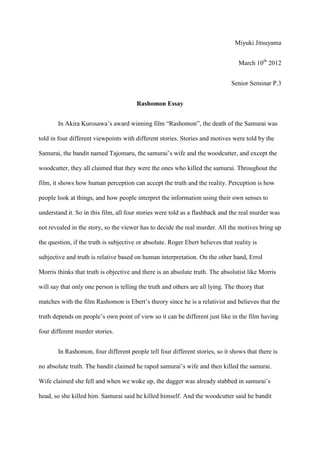
Rashomon essay
- 1. Miyuki Jitsuyama March 10th 2012 Senior Seminar P.3 Rashomon Essay In Akira Kurosawa’s award winning film “Rashomon”, the death of the Samurai was told in four different viewpoints with different stories. Stories and motives were told by the Samurai, the bandit named Tajomaru, the samurai’s wife and the woodcutter, and except the woodcutter, they all claimed that they were the ones who killed the samurai. Throughout the film, it shows how human perception can accept the truth and the reality. Perception is how people look at things, and how people interpret the information using their own senses to understand it. So in this film, all four stories were told as a flashback and the real murder was not revealed in the story, so the viewer has to decide the real murder. All the motives bring up the question, if the truth is subjective or absolute. Roger Ebert believes that reality is subjective and truth is relative based on human interpretation. On the other hand, Errol Morris thinks that truth is objective and there is an absolute truth. The absolutist like Morris will say that only one person is telling the truth and others are all lying. The theory that matches with the film Rashomon is Ebert’s theory since he is a relativist and believes that the truth depends on people’s own point of view so it can be different just like in the film having four different murder stories. In Rashomon, four different people tell four different stories, so it shows that there is no absolute truth. The bandit claimed he raped samurai’s wife and then killed the samurai. Wife claimed she fell and when we woke up, the dagger was already stabbed in samurai’s head, so she killed him. Samurai said he killed himself. And the woodcutter said he bandit
- 2. killed the samurai. The reality is that the samurai was murdered, but the truth can differ depend on people’s point of view and this is supported by Ebert’s theory. Each character saw different things and they all have different background, and that might have caused them to see things in different way. But there is no true or false. The truth might be different among people, but they might actually believe what they saw, so it is true in their own ways. And also, it is not that every character had same relationship with the samurai, so the way they feel about samurai or his death might differ and because of that, the truth might have changed. Truth can depend on perception, because if people see things differently and perceive the situation in different way, then the truth will change. So in this movie, the perceptions of characters were different, so the truths were all different based on perception. On the other hand, Morris does not care about individual’s own perception, and believes that there is only one absolute truth. He does not care about people’s motives and thinks that people lie, so the use of motives to find out the truth is just pointless and it is never certain. He also believes that people only see things they want to see, so people just automatically eliminate the unimportant things and only see the important aspects. Because of that, the motives are very uncertain so if we consider motives as clues to find out the truth, we might guess the wrong truth and never gets to the real answer to it. In this film, the real murder is not revealed. At the court, every character faced the audience and when they talked, they repeated the questions that were asked so the audience knows the questions and the answer to it. So the audience is the one who has to listen to the motives and judge them. Therefore, the Morris’ theory does not match with the film since it only believes in one absolute truth and in this movie; there are four different kinds of truths. “Human beings are unable to be honest with themselves about themselves. They cannot talk about themselves without embellishing.” (Ebert) and this concept is shown throughout the film. At the court, four character reveals what they saw based on their belief
- 3. and perception. From the four characters, audience thinks that the dead samurai and the woodcutter are not lying for sure because how can the dead man lie, and also the woodcutter saw everything from the third person point of view. But actually woodcutter stole a dagger but he did not want to reveal about it, so the audience are suspicious of him lying, and also the samurai said he killed himself because in Japan, you are honored to kill yourself, but actually maybe he didn’t want to say the truth of what happened because he didn’t want to get ashamed. So people have to actually lie sometimes to cover up the truth, but they actually believe in what they think they saw, so the truth is still a truth. The relativist like Ebert will sure accept this and still think the motives are important because it gives us some clues to find out the murder and he accepts variety of truth because he understands the fact that different people interpret the truth in different ways. Among the two different theories; Morris’ and Ebert’s, Ebert’s theory fits the film Rashomon better since he is an relativist and accepts different kinds of truth. Although the motives are different, it is true in their own way since everyone perceives the situation differently and it is true in their mind. The one reality is that the samurai is dead, and there are different truths based on different people’s point of view, therefore, Ebert’s theory best explains the film Rashomon by Kurosawa. 953 words Work Cited Ebert, Roger. "Rashomon :: Rogerebert.com :: Great Movies." Rogerebert.com. 26 May 2002. Web. 11 Mar. 2012. <http://rogerebert.suntimes.com/apps/pbcs.dll/article?AID=/20020526/REVIEWS08/205260301/1023 >.